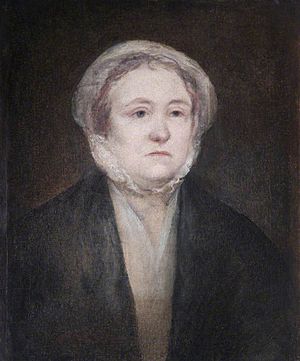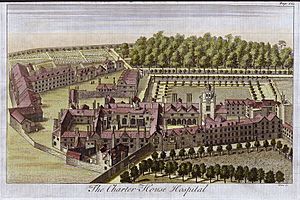Anna Williams (poet) facts for kids

Anna Williams (born 1706, died September 6, 1783) was a talented Welsh poet. She was a very close friend of the famous writer Samuel Johnson. He felt very sad and "desolate" when she passed away.
In the 1740s, Anna Williams started losing her sight because of a condition called cataracts. Samuel Johnson then offered her his help and support. She moved into his home and lived with him until she died, except for a six-year period. In return, Anna helped Johnson manage his household and finances. Besides writing poetry, she also started a dictionary of ideas and translated a French book about the Roman emperor Julian.
Contents
Anna Williams's Life Story
Her Early Years
Anna Williams was born in Rosemarket, Pembrokeshire, Wales. Her father, Zachariah Williams, was a scientist and doctor. Her mother's name was Martha. Anna received a broad education in arts and science from her father. She also learned Italian and French.
Around 1726 or 1727, her family moved to London. They lived at the Charterhouse. Anna helped her father with his experiments on magnetism. He was trying to win the longitude prize, which was a big reward for finding a way to accurately measure longitude at sea. In 1745, her father became ill and was hospitalized. Anna then became his main helper at home. Even though her eyesight began to fail in the 1740s, she could still sew. In 1746, she published her translation of a French book about the emperor Julian.
Living with Samuel Johnson
In 1748, Anna and her father needed help. They reached out to Dr. Johnson. He had been interested in her father's experiments and helped him publish his ideas about longitude. Later, Johnson also arranged for a surgeon named Samuel Sharp to operate on Anna's eyes for her cataracts.
When the operation didn't work, Anna became a part of Johnson's household. She lived with him in all his different homes until just before her death. There was one time, from 1759 to 1765, when Johnson moved. During this time, Anna lived in Bolt Court, Fleet Street. Johnson would visit her every night for tea, no matter how late it was. She always stayed up for him. In 1763, James Boswell, another famous writer, proudly joined Johnson for tea with Miss Williams.
In 1765, Anna moved back into Johnson's home. She lived with him at 7 Johnson's Court, Fleet Street, and later at 8 Bolt Court. She managed his household and kept track of his expenses from a ground-floor apartment. Anna often helped Johnson when he had guests. She also went with him on visits. If she couldn't go, he would send a meal home to her.
Anna knew many literary works and could express herself well. Because she had lived with Johnson for so long, she understood his habits. She knew how to get him talking. Johnson was also playful with her. A friend named Frances Reynolds said he would "whirl her about on the steps" when they were visiting.
Anna received money each year from friends, like Lady Philipps of Picton Castle. But Samuel Johnson also helped her financially. For example, he arranged a special show at the Drury Lane theatre in 1756. The money from this show went to Anna, who was described as "a gentlewoman deprived of her sight." In 1774, Johnson helped her apply for charity, but she was not eligible because she was Welsh.
Her Last Days
As Anna Williams grew older and weaker, she sometimes became difficult with others in the household. However, this did not change Johnson's care for her. He even wrote a prayer for her during her last illness. After she died, he wrote, "Her curiosity was universal, her knowledge was very extensive, and she sustained forty years of misery with steady fortitude. Thirty years and more she has been my companion, and her death has left me very desolate."
Johnson's friends noticed her occasional grumpiness. But they also recognized her learning and intelligence. When she died, Anna left £200 in stocks and £157.14s. in cash to the Ladies' Charity School in Snow Hill, London.
Anna Williams's Works
- Miscellanies in Prose and Verse: This book was published in 1766. Samuel Johnson wrote a preface for it and included some of his own writings. It was advertised in 1750. Some of Anna's friends felt Johnson didn't do enough to get it published. However, it was quite successful and earned Anna about £150.
- A dictionary of philosophical terms: Anna started this dictionary in 1754. It was probably inspired by Johnson's own famous dictionary. She stopped working on it, even though Johnson supported her. He once wrote that "She understands chimistry and many other arts."
- Occasional verses: These were poems written for specific events. One example is "On the Death of Sir Erasmus Philipps, Unfortunately Drowned in the River Avon."
Experts say that Anna Williams was a skilled writer, but not a genius. Her poems were capable and effective, even if they followed common styles. Miscellanies is a collection of different pieces, including poems, prose, and parts of plays. The poet Alexander Pope influenced her writing, as seen in this line:
- For me, contented with a humble state
- 'Twas ne'er my care, or fortune, to be great.
Sources
- The first edition of this text is available at Wikisource:
 "Williams, Anna". Dictionary of National Biography. (1885–1900). London: Smith, Elder & Co.
"Williams, Anna". Dictionary of National Biography. (1885–1900). London: Smith, Elder & Co. - Boswell, Life, 1.232–3, 241, 350, 393, 421, 463; 2.5, 286, 427; 3.48, 132; 4.235; 5.276
- J. Hawkins, The life of Samuel Johnson, LL.D., ed. B. H. Davis (1962), 134–6
- Lady Knight, 'Anecdotes and remarks', in Johnsonian miscellanies, ed. G. B. Hill, 2 (1897), 171–5
- J. P. Phillips, 'Mrs Anna Williams', N&Q, 3rd ser., 1 (1862), 421–2
- Richard Fenton, A Historical Tour through Pembrokeshire (1811), 197–200
- Johnsonian miscellanies, ed. G. B. Hill, 2 vols. (1897), vol. 1, pp. 114–15, 401–3; vol. 2, pp. 217–18, 279
- The letters of Samuel Johnson, ed. R. W. Chapman, 3 (1952), 69–75
- Nichols, Lit. anecdotes, 2.178–84
- G. W. Stone, ed., The London stage, 1660–1800, pt 4: 1747–1776 (1962), 522
- ESD Journal
 | William M. Jackson |
 | Juan E. Gilbert |
 | Neil deGrasse Tyson |


